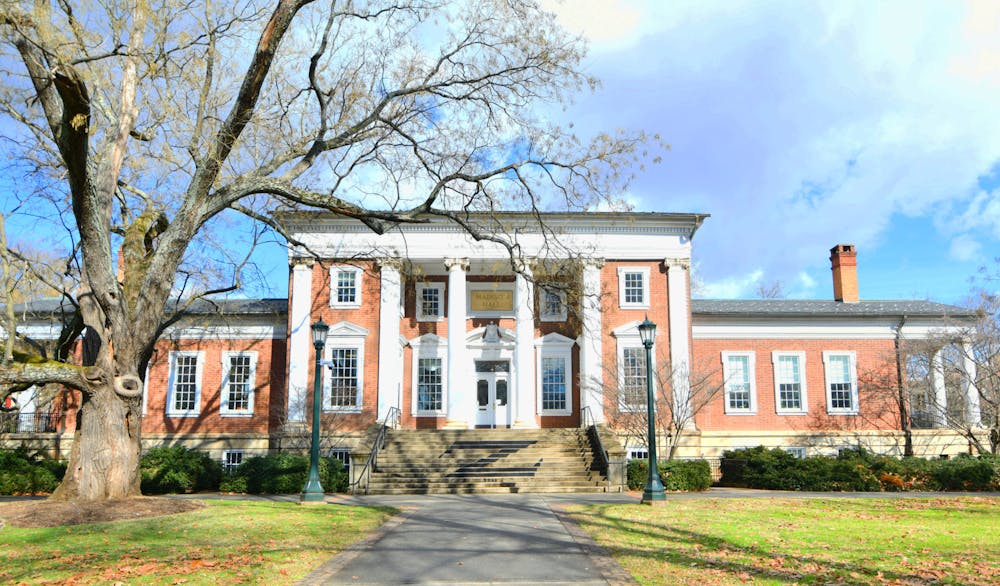Amidst ongoing controversies regarding University responses to political issues, University President Jim Ryan has formed a new committee to advise him on when and how to issue social and political statements in his capacity as University president. The new Committee on Institutional Statements began meeting this month and will develop a set of advisory guidelines for Ryan throughout the course of the semester.
Last semester, Ryan voiced concerns about the lack of protocol for University responses to social and political issues at a Board of Visitors meeting, where he expressed the need for a set of institutional guidelines. According to Ryan, who faced some backlash from students for his initial response to Hamas’s attack on Israel Oct. 7, the lack of formal guidance on when and how socio-political speech should be conducted by the University has made issuing statements a challenge.
Ryan’s concerns emerged as other universities struggled to navigate conversations regarding institutional statements. Controversies surrounding formal statements from universities have led to attacks on some university presidents, resulting in Claudine Gay’s resignation from Harvard University and Liz Magill’s departure from the University of Pennsylvania.
According to Lillian Rojas, the Committee’s student representative and fourth-year Batten student, Ryan invited individuals to join the Committee early in the semester. Rojas, who also serves as the BOV’s student member, said University statements should not be taken lightly due to potential impacts on student and community morale.
“I definitely think [University statements] need to be carefully crafted, thought through and only instituted in absolutely necessary situations rather than just being loosely thrown around,” Rojas said. “They do have an impact on students, and it has the power to either uplift the student or tear them down.”
In addition to Rojas, the Committee consists of eleven other members including professors, donors, alumni, BOV members and others. Politics prof. John M. Owen IV serves as chair of the Committee, which includes other notable University figures including Melody Barnes, executive director of the Karsh Institute of Democracy.
Rojas said she didn’t know the details of the selection process, but said the Committee members are all accomplished in their fields of specialty, which span across several departments, organizations and businesses throughout the local community. Rojas said she intends to contribute objectively based on her experiences interacting with student perspectives.
“I’m definitely going into committee meetings with the goal of portraying the student perspective as representative as possible,” Rojas said. “[I’m aiming to keep] my own opinions and viewpoints out of it, serving on this committee in my capacity as a member of the Board [and] honoring that commitment that I’ve made to portray student opinion, as I see it, in the most accurate way possible.”
According to Rojas, the Committee is going to work to find the best solution to benefit most students. She said that trying to represent student interests and well-being does not entail speaking out on “every single political or social issue” that arises.
Fourth-year McIntire student Tarun Donipati said considering new perspectives from a committee is a promising idea, but the Committee itself may not contain enough diverse perspectives from the University community.
“I think the problem arises in the composition of the team and … how the conversations are structured,” Donipati said. “If you want to highlight new voices, new perspectives and create a more comprehensive overview of the perspectives of U.Va., you need a more diverse group of people that accurately represents the population within U.Va.”
Similar to Rojas, Donipati said because of the strong impact of student responses to University statements, the University should evaluate whether to speak on certain issues.
“When things are a bit more controversial, the University should deliberate on whether to vocalize or not … which position they would take,” Donipati said. “I think to get there, you need a good diverse group of people, and for the conversation to facilitate those voices being heard.”
Many universities around the country have justified their neutrality or silence since the Oct. 7 attack by Hamas on Israel by referencing the Kalven Report, a 1967 document prepared by a committee that advised the University of Chicago on when to release political statements. The report recommended institutional neutrality and the protection of dissenting voices, but it has faced significant criticism since it was first commissioned, with some seeing the report as a way to justify silence in the face of injustice.
According to Rojas, the Committee was given a timeline that expects them to draft guiding principles by the end of this semester. Though Rojas said she is not certain that this semester’s draft will be the final comprehensive recommendation, she said it will at least serve as a foundation that the University may build upon.
The Committee will continue to meet throughout the course of the semester as they work towards a final product.
“I would assume that hopefully, we're going to really put an emphasis on [caring about the well-being of all students] so even when statements aren't necessary, there still is no question that the University cares for every single student here,” Rojas said.







